Select Language

BEIJING (Reuters) - China's finance ministry has allocated a first batch of 237.9 billion yuan ($33.38 billion) of funds from sovereign bonds as of Monday, in an effort to support the renovation of infrastructure in areas hit by natural disasters, state media CCTV reported.
The funds were part of a plan unveiled in October when China said it would issue 1 trillion yuan of sovereign bonds to enhance disaster-prevention infrastructure, the report said.
The plan to help rebuild areas hit by this year's floods and improve urban infrastructure to cope with future disasters has widened China's 2023 fiscal deficit target to 3.8% of gross domestic product from the original 3%.
The first batch of funds will support more than 2,900 projects, CCTV reported, including 107.5 billion yuan to help with rebuilding and disaster prevention and mitigation.
Another 125.4 billion yuan will be used to subsidise high-standard farmland in the northeastern region and the Beijing-Tianjin-Hebei region, and 5 billion yuan will go to major natural disaster prevention and control system projects, CCTV added.
China's finance ministry did not respond immediately to a Reuters request for comment on when it started issuing the bonds.
China has grappled with weather extremes this year, from ultra-low temperatures in January to record rainfall and a blistering hot summer, in wild swings that scientists attribute to climate change.
Temperatures in parts of China, including in provinces Shanxi, Hebei and Liaoning, hit their lowest levels since records began, CCTV said on Sunday, as a cold snap gripped large swathes of the country.
Northern China, including the capital city of Beijing, were the hardest hit by floods after record rainfall from Typhoon Doksuri in July and August. Southern China, including economic powerhouses Guangdong and Fujian provinces, has been hit by two typhoons since September.
($1 = 7.1274 Chinese yuan renminbi)

By Jan Strupczewski, Krisztina Than and Ingrid Melander
BRUSSELS (Reuters) - European Union leaders expressed confidence on Friday that they would clear a large package of aid for Ukraine early in 2024, despite a veto by Hungarian Prime Minister Viktor Orban.
All 27 EU states except Hungary agreed on Thursday to start accession talks with Ukraine despite its invasion by Russia, bypassing Orban's grievances by getting him to leave the room.
But they could not overcome his resistance to revamping the EU budget to channel 50 billion euros ($55 billion) to Kyiv and provide more cash for other tasks such as managing migration.
Kyiv is reliant on foreign assistance as Russia's war in Ukraine rages on, and U.S. President Joe Biden has so far been unable to get a $60 billion package for Kyiv through Congress.
EU leaders, who would prefer a deal backed by all members but also have a plan B, are expected to revisit the issue at an emergency summit at the end of January or early in February.
"We are working very hard to have an agreement by 27 member states," European Commission President Ursula von der Leyen said, adding: "But I think it is now also necessary to work on potential alternatives to have an operational solution in case that an agreement by 27, so unanimity, is not possible."
German Chancellor Olaf Scholz and French President Emmanuel Macron were among those expressing optimism on getting the aid to Kyiv, which is part of a broader multi-year EU budget plan.
"We have other ways of helping Ukraine, but we have not given up on the goal of finding a solution here," said Scholz, who diplomats and officials said played a big role in getting Orban to leave the room to clear the way for a decision on starting accession talks.
Macron said the EU was "not blocked" from providing aid next year, adding he felt Orban had an incentive to reach a deal.
The EU could continue to help with a workaround that involved a deal between 26 members and Ukraine, which would also deny Budapest access to linked EU funds, such as on migration.
The Kremlin praised Orban, who maintains close ties to Russia, and said the EU decision to open accession talks with Kyiv was politicised and could destabilise the bloc.
Orban, who has a history of trying to use disagreements with other EU leaders for his electoral benefit, told state radio he had blocked the aid to ensure Budapest gets EU money that is frozen over concerns about the rule of law in Hungary.
"It is a great opportunity for Hungary to make it clear that it must get what it is entitled to," he said.
The EU restored Hungary's access to 10.2 billion euros of frozen funds this week, but 21.1 billion euros remain locked.
'BAD DECISION'
Ukrainian President Volodymyr Zelenskiy hailed the approval of membership talks as a victory for Ukraine and Europe.
And while Lithuanian President Gitanas Nauseda said that while it made him "proud to be European", he added it was "only the first page of a very long, long process".
Orban, meanwhile, called the move a "bad decision".
"We can halt this process later on, and if needed we will pull the brakes," he said.
EU leaders ended talks on the financial package in the early hours of Friday, with all except Orban agreeing to provide Ukraine with 50 billion euros over four years. His veto blocked the funds, however, because the decision requires unanimity.
The best legal form for providing aid outside the EU budget is to be determined, but the Commission could coordinate a collection of grants for Kyiv.
Ukraine is unlikely to join the EU for many years, but the decision on talks took it a step closer to its long-term goal of anchoring itself in the West and leaving Russia's orbit.
($1 = 0.9162 euros)
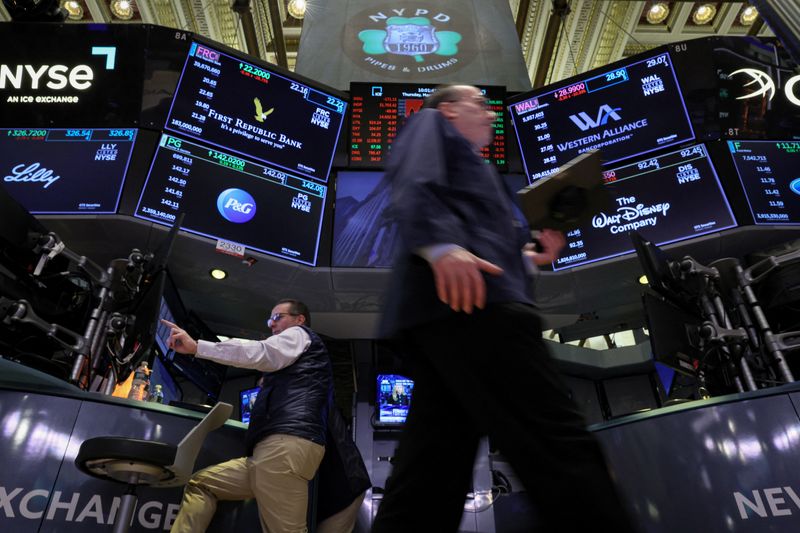
Investing.com -- Markets are entering the closing weeks of 2023 after Federal Reserve Chair Jerome Powell said the historic tightening of monetary policy is likely over and discussion of rate cuts is coming "into view". Investors will get a final update on U.S. inflation for this year, while the Bank of Japan may be inching toward a long-awaited policy pivot. Here’s what you need to know to start your week.
1. U.S. data
Investors will get their last update on inflation for this year with Friday's release of the personal consumption expenditures report, the Fed’s primary inflation gauge.
Economists are expecting the PCE price index to remain flat for a second month in November, while the core measure that strips out volatile food and energy costs is seen rising 0.2%.
There will also be data on consumer confidence, initial jobless claims and durable goods orders, while updates on the housing sector include reports on both new and existing home sales.
Atlanta Fed President Raphael Bostic is due to speak on Tuesday.
2. Santa Claus rally?
The Dow Jones industrial average notched another record high close on Friday, and the S&P 500 ended little changed, but registered a seventh straight week of gains in its longest weekly winning streak since 2017.
Some optimism among investors dampened after Fed Bank of New York President John Williams said on Friday it was too soon to be talking about rate cuts.
"What I think we got this week is that (Fed Chair Jerome Powell) doesn't want to overly punish the economy with (rates) being higher for longer for no good reason," Kim Forrest, chief investment officer at Bokeh Capital Partners in Pittsburgh told Reuters.
"I don't know if we're going to get whatever is considered a Santa Claus rally, but it looks like all things being considered, we could drift higher from here."
3. BOJ inching towards pivot
Expectations are mounting that the Bank of Japan could end negative interest rates in the coming months, again making it a global outlier as the focus at the Federal Reserve and other major central banks turns to when to begin cutting rates.
A change is unlikely to come at the BOJ’s upcoming policy meeting on Tuesday, but investors will be scrutinizing the bank’s rate statement for any indications that a pivot could come at its next meeting in January.
That expected pivot, plus the Fed's dovish tilt, has pushed the yen back to the stronger side of 141 per dollar for the first time since July.
BOJ Governor Kazuo Ueda said last week the central bank was facing an "even more challenging" situation at year-end and at the start of 2024, jolting markets as speculators ramped up bets that a policy shift was imminent.
4. Gold on track for first annual gain since 2020
Gold is on track to notch up its first annual increase since 2020, fuelled by a weaker dollar and growing expectations for rate cuts in 2024.
Lower interest rates increase the appeal of holding zero-yield bullion.
Real U.S. 10-year yields have been rising non-stop since early 2022, but only turned positive in June, knocking gold back from a near-record. They are now at their highest in eight years, but this has been no barrier to gold vaulting above $2,000 an ounce. And yet the price is still some 20% below its inflation-adjusted all-time high above $2,500 in 1980.
Investors are banking on a flurry of rate cuts next year, while political and economic uncertainty are on the rise - potentially heralding a sweet spot for gold investors.
5. U.K. data
U.K. inflation is currently running at more than double the Bank of England's 2% target and the latest data on Wednesday is likely to confirm price pressures remain elevated compared to other major economies.
The pound hit a three-month high against the euro this month after euro zone inflation dropped sharply, fueling speculation the BoE will take longer to cut rates than the European Central Bank.
But high rates could also tip the U.K. economy, which the BoE expects to flat-line in 2024, into recession, meaning sterling strength is not a one-way bet. The pound's fate rests on whether the BoE keeps reacting to current inflation trends or takes the longer-term view that economic weakness will dampen wages and prices.
--Reuters contributed to this report
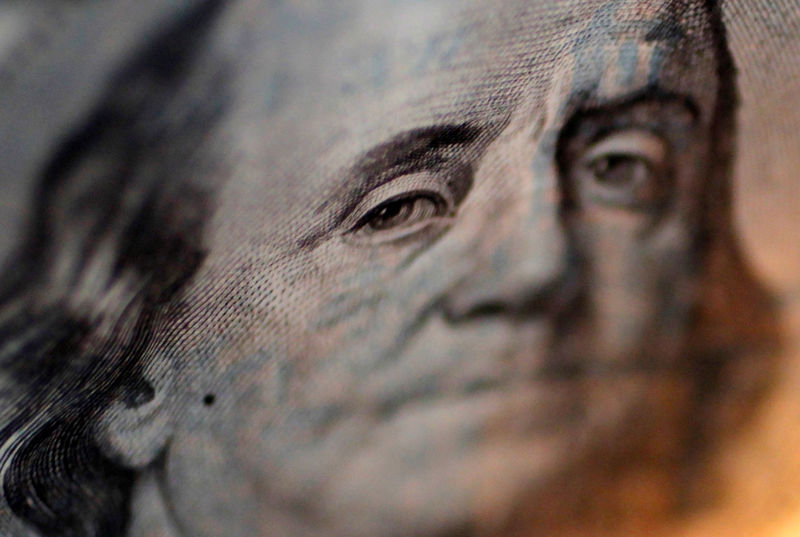
Investing.com-- Most Asian currencies steadied after a recent rally on Friday, while the dollar languished at four-month lows as traders positioned for deeper-than-expected interest rate cuts by the Federal Reserve in 2024.
More stimulus measures in China also aided sentiment, as the People’s Bank of China injected 1.45 trillion yuan ($200 billion) into the economy through its medium-term lending facility.
But the move offered little support to the yuan, given that it signals that the PBOC will keep its loan prime rate at record lows next week. The currency traded sideways on Friday.
Economic data also offered some positive cues on China. Industrial production grew more than expected in November, although retail sales and fixed asset investment missed expectations.
Still, weakness in the dollar kept the yuan trading near a six-month high.
Broader Asian currencies advanced slightly, tracking a weaker dollar and as the prospect of lower U.S. interest rates drove investors into risk-driven, high-yield assets.
The Australian dollar- a major indicator of Asian risk sentiment- rose 0.3% to an over four-month high.
The Japanese yen steadied near a four-month high to the dollar, having appreciated sharply against the greenback in recent sessions. But further gains in the yen were uncertain, with the Bank of Japan expected to maintain its ultra-dovish stance in its final meeting for the year on the coming Tuesday.
Purchasing managers index data pointed to more weakness in the Japanese economy, with a preliminary reading for December showing a deeper-than-expected contraction in manufacturing activity.
Among the few outliers for the day, South Korea’s won fell 0.2% after a strong run this week, while the Indian rupee hovered near record lows, having moved little against a weaker dollar.
While optimism over India’s economy drove local stocks to record highs, traders remained wary of the rupee on caution over India’s massive trade deficit. The Reserve Bank has also signaled no more interest rate hikes, despite a recent uptick in inflation.
Dollar languishes at 4-mth low, rate cuts in focus
The dollar index and dollar index futures fell slightly in Asian trade and were at their weakest levels since mid-August.
The greenback was set to lose about 2% this week after the Fed said it was done raising interest rates, and projected deeper rate cuts in 2024.
The Fed’s comments also spurred deep losses in U.S. Treasury yields, and diminished the dollar’s appeal as traders began speculating over just when the Fed will begin trimming interest rates.
Fed fund futures prices show traders pricing in an over 70% chance for a rate cut in March 2024. Goldman Sachs expects the central bank to enact three, back-to-back 25 basis point cuts, beginning in March.
Upgrade your investing with our groundbreaking, AI-powered InvestingPro+ stock picks. Use coupon INVSPRO2024 to avail a limited time discount on our Pro and Pro+ subscription plans. Click here to know more, and don't forget to use the discount code when checking out!
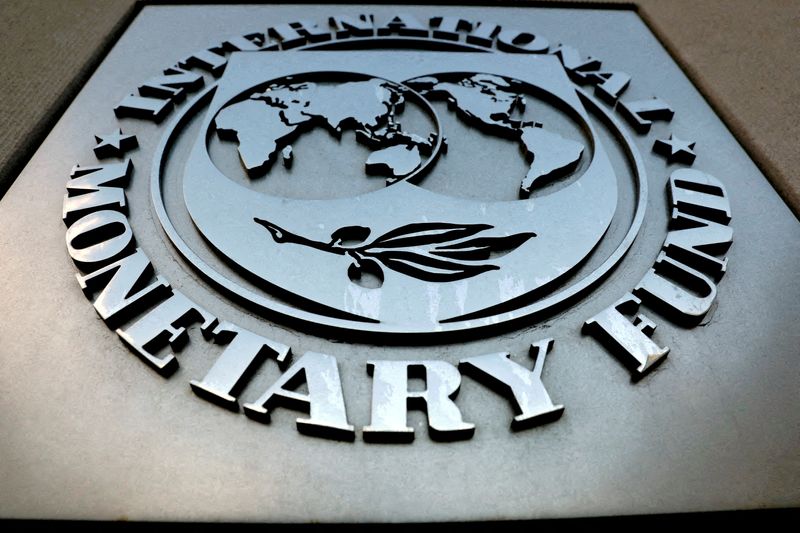
By Jorgelina do Rosario
BUENOS AIRES (Reuters) -Argentina is set to receive financing from the Development Bank of Latin America and the Caribbean (CAF) to make a $913 million payment due to the IMF next week, two sources familiar with the matter told Reuters.
Argentina, whose $44 billion International Monetary Fund programme makes it the largest debtor to the fund, is due to make the capital payment on Dec. 21.
South America's second largest economy suffers from deeply negative reserves and had to make use of loans from CAF as well as Qatar, and a swapline with China's central bank to make recent payments to the fund on time.
A spokesperson for Argentina's new President Javier Milei did not immediately reply to a request for comment. CAF did not immediately respond to a Reuters request for comment.
Argentina's new Economy Minister Luis Caputo met CAF Executive President Sergio Diaz-Granados on Monday, one source said.
All financing by CAF will need to be signed off by its board.
Caputo said in an interview televised on Wednesday evening that the government would make the payment to the IMF, but did not detail how.
Separately, two sources familiar with the situation told Reuters that IMF staff would hold an informal briefing with the fund's board on Argentina on Monday.
Using CAF funds will allow Argentina's new government to circumvent using the PBOC swapline, which helped the previous government repay debt owed to the IMF.
Argentina's libertarian president repeatedly insulted communist-run China in his election campaign, but has sounded more conciliatory towards the country's second-largest trade partner since winning the vote in November.
On Tuesday, Caputo announced a slate of economic measures including a more than 50% devaluation of the peso to 800 per U.S. dollar and energy and transportation subsidy cuts in a bid to dig the country out of a deep economic crisis.
Argentina's total sovereign debt exceeds $400 billion, and payments due to the IMF and other creditors total about $4 billion in January alone.
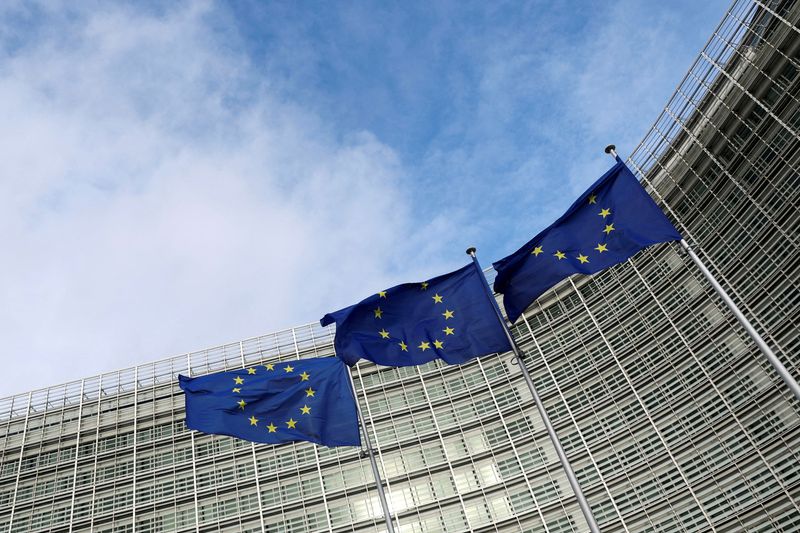
By Julia Payne and Andrew Gray
BRUSSELS (Reuters) - European Union countries agreed on a 12th package of sanctions against Russia, the European Council said on Thursday, meaning that a phased ban on Russian diamond imports among other measures will come into effect from Jan. 1.
The EU has been adding sectoral and individual sanctions since Russia's invasion of Ukraine in February 2022 in an attempt to cut off revenues and military equipment feeding Moscow's war machine.
"The European Council welcomes the adoption of the 12th package of sanctions," its concluding statements said.
While the text of the package had been agreed by all countries earlier this week, diplomatic sources said, Austria held back on giving its final approval until late on Thursday. Austria said on Wednesday while it was not opposed, the capital needed time to examine the legal texts.
However, sources familiar with the matter said the country had been attempting to have Raiffeisen Bank International, the biggest Western bank in Russia, struck off a Ukrainian blacklist in return for signing off on fresh European Union sanctions on Russia.
Raiffeisen still appears on Ukraine's list.
The new sanctions package includes a direct ban on Russian non-industrial diamond imports from Jan. 1 and a phased ban on diamond imports from third countries starting from March in alignment with the Group of Seven (G7) countries.
Other measures include tightening the proof required from companies who claim they adhere to the G7 Russian oil price cap. The package also added measures to prevent Russia from obtaining dual-use goods by making EU companies have their counterparties on certain products sign contracts prohibiting re-export to Russia.
A notification procedure for Russian citizens or entities in Russia wishing to transfer more than 100,000 euro ($109,920.00) out of the EU was also included.
($1 = 0.9098 euro)
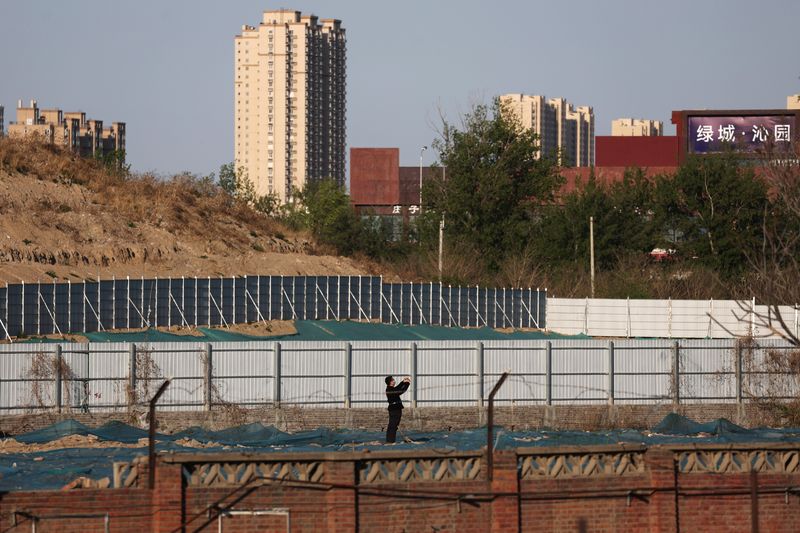
BEIJING (Reuters) - China's new home prices fell for the fifth straight month in November, official data showed on Friday, as the sector still struggles to elbow its way out of a weak market in the face of dampened confidence in demand and investment.
New home prices fell 0.3% month-on-month after a similar 0.3% dip in October, according to Reuters calculations based on National Bureau of Statistics (NBS) data.
Prices fell at the fastest pace in seven months year-on-year, down 0.2% in November, compared with a 0.1% decline in October.
China has been ramping up measures to cushion the impact of the property downturn on its economy, but the property market has failed to stage a robust rebound.
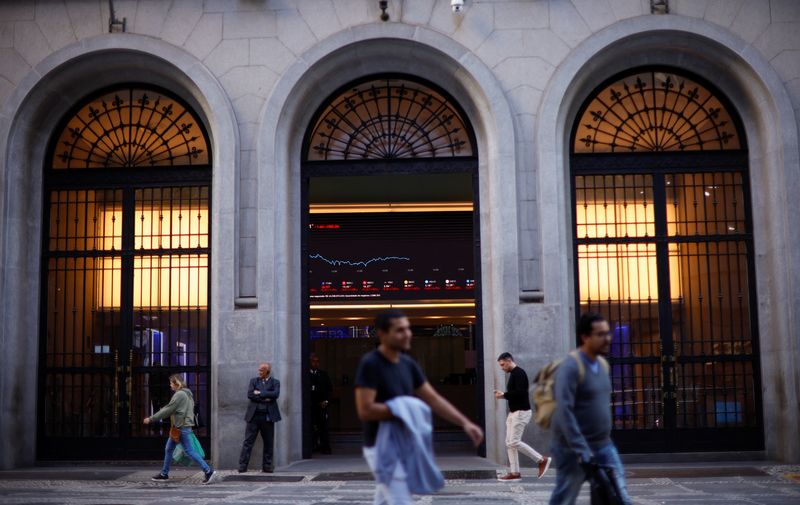
SAO PAULO/MEXICO CITY (Reuters) -Brazilian and Mexican stocks rose to record highs on Thursday, propelled by the U.S. Federal Reserve's signaling toward lower interest rates in 2024 and monetary policy decisions in both Latin American nations.
In Brazil, stocks were partially driven by the local central bank's rate cut on Wednesday evening, with board members indicating that 50-basis-point cuts will continue past its next meeting in January.
Brazil's equities benchmark index Bovespa settled up 1.06% on Thursday, reaching a new closing high of 130,842.09 points, after climbing to an intraday record of 131,259.81 earlier in the day. The previous records had been set in June 2021.
The positive session was also helped by oil firm Petrobras' shares, which were up 2.17% at close as oil prices trended higher.
Mexico's main stock index rose 3.39% to a historic close of 57,036.42 points, though it also inched even higher during trading to an intraday high of 57,077.52 points.
The index was propelled by Mexico's airport operators, a day after Grupo ASUR announced details of its 2024-2028 master development plan.
Earlier in the day, Mexico's central bank unanimously held the country's interest rate at 11.25% and pointed toward more of the same "for some time."
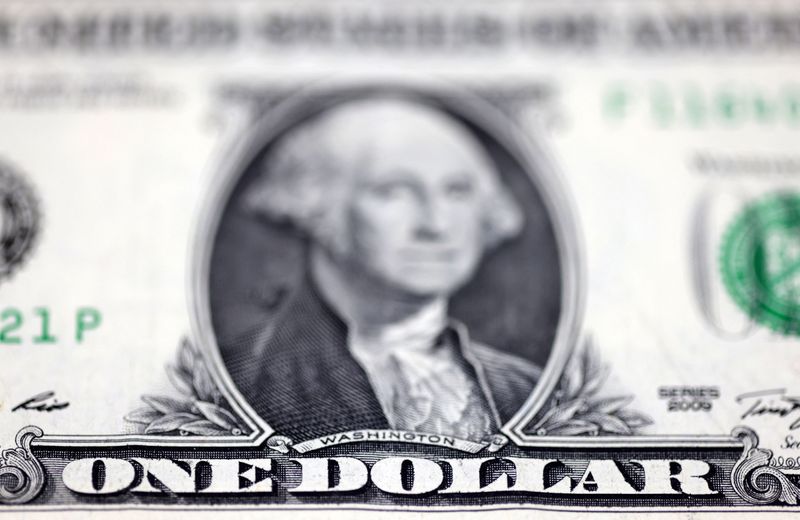
(Corrects to add "FOREX" to headline)
By Brigid Riley
TOKYO (Reuters) -The dollar dropped to a fresh four-month low on Thursday after the Federal Reserve's latest economic projections indicated the interest-rate hike cycle has ended and lower borrowing costs are coming in 2024.
The yen jumped in response, briefly breaking below 141 yen versus the greenback for the first time since late July.
Meanwhile, the Aussie and New Zealand dollar surged to new multi-month highs after Australian employment data blew past forecasts.
Fed Chair Jerome Powell said at Wednesday's Federal Open Market Committee (FOMC) meeting that the historic tightening of monetary policy is likely over, with a discussion of cuts in borrowing costs coming "into view." Policymakers were nearly unanimous in their projections that borrowing costs would fall in 2024.
"This is a huge development for markets as we head into the new year and provides much-needed clarity. And clarity in this instance meant risk-on," said Matt Simpson, senior market analyst at City Index.
The U.S. dollar index, which measures the greenback against a basket of currencies, slipped as far as 102.42, it's lowest since mid-August. It was last down 0.31% at 102.56.
The FOMC meeting will likely overshadow upcoming economic data before personal consumer expenditures data is published next week, leaving room for "further downside potential for the US dollar," Simpson said.
Markets are now pricing in around a 75% chance of a rate cut in March, according to CME FedWatch tool, compared with 54% a week earlier.
The yen continued to strengthen in the wake of the greenback's tumble, climbing to its highest since July 31 at 140.95 yen per dollar. It was last up around 1% at 141.46 yen.
The dovish FOMC meeting may have caught some traders who were bearish on yen and bullish on the dollar by surprise, prompting them to quickly unwind positions, said Masafumi Yamamoto, chief currency strategist at Mizuho Securities.
Japanese exporters who haven't yet increased hedge ratios are likely rushing to make adjustments as well, he added.
Expectations that the Bank of Japan (BOJ) could end negative interest rates at its monetary policy meeting on Dec. 18-19 have largely died down, but the BOJ could make tweaks to its statement, such as language that the bank will not hesitate to ease further if necessary, said Yamamoto.
That kind of change could "be regarded as one step toward normalisation...so that could be positive for the Japanese yen," he said.
Focus now shifts to a parade of central bank decisions, including the European Central Bank and the Bank of England (BoE), Norges Bank and Swiss National Bank.
The Norwegian central bank is considered to be the only bank that could potentially raise rates. There is also a risk the SNB could dial back its support for the Swiss franc in currency markets.
The euro rose 0.25% to $1.09015, while sterling was last trading at $1.2642, up 0.19% on the day.
The Australian dollar, meanwhile, hit over a four-month high at $0.6728 after domestic net employment jumped by 61,500 in November, compared to an increase of around 11,000 that markets had been forecasting.
The kiwi rose 1.04% versus the greenback to $0.6238, despite data showing the New Zealand economy unexpectedly contracted in the third quarter.
In cryptocurrencies, bitcoin rose 0.39% to $43,057.
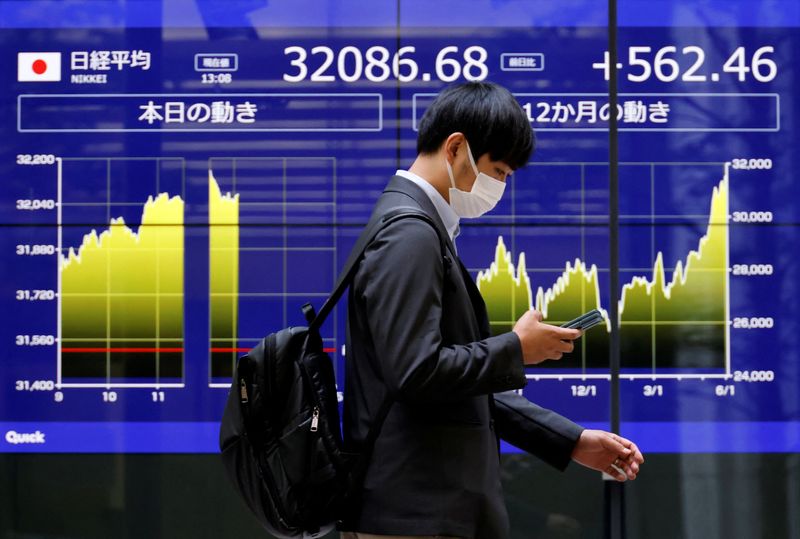
By Xie Yu
HONG KONG (Reuters) - Asian stocks broadly rallied on Thursday, after the U.S. Federal Reserve flagged the end of its tightening cycle and struck a dovish tone for the year ahead.
U.S. Treasury yields slid to a fresh four-month trough, while the dollar continued to slide.
MSCI's broadest index of Asia-Pacific shares outside Japan shot up 1.8%, its biggest one-day percentage jump in a month.
Mainland Chinese blue chips edged up by 0.2%, while Hong Kong's benchmark advanced 1.2%. Australian shares were up 1.6%.
However, Japan's Nikkei slid 0.7%, weighed down by the yen's sharp rally.
The Fed left interest rates unchanged on Wednesday and U.S. central bank chief Jerome Powell said its historic tightening of monetary policy is likely over with inflation falling faster than expected.
A near-unanimous 17 of 19 Fed officials project that the policy rate will be lower by the end of 2024 than it is now - with the median projection showing the rate falling three-quarters of a percentage point from the current 5.25%-5.50% range. U.S. fed funds futures boosted the chances of rate cuts starting as soon as in March after the Fed decision, according to LSEG's FedWatch. The market has priced in more than 150 bps of easing next year.
"It was a very aggressive pivot," said Ben Luk, global macro strategist at State Street (NYSE:STT) Asia Limited.
"The Fed has followed market expectation in terms of allowing for one more rate cut to be added into both the 2024 and the 2025 (outlooks)," he said.
That aggressive pivot will have a mixed impact in Asia, with tech shares to benefit more while markets including Japan will have a dampening effect as its currency strengthens with a weakening U.S. dollar, he added.
"Overall, the meeting was a bit more dovish than we expected," said Christian Scherrmann, U.S. economist at DWS.
"However, we would like to remind that they are not yet on autopilot to the runway and that the timing of the first rate cuts still depends on the evolution of the incoming data and, in particular, of inflation," he added.
It is a busy week for central banks, with the European Central Bank, Bank of England and Swiss National Bank all announcing policy decisions on Thursday. The Bank of Japan's turn comes on Tuesday.
U.S. stocks surged to a sharply higher close on Wednesday and benchmark Treasury yields slid to their lowest level since Aug. 10.
U.S. stock futures, the S&P 500 e-minis, were up 0.4% on Thursday, while the 10-year Treasury yield pushed down further to as low as 3.9845%, breaking below the psychological 4% mark.
The U.S. dollar index, which measures the greenback against a basket of currencies, fell a further 0.25% to 102.62.
The euro gained 0.2% to $1.0899.
The yen sat significantly higher, with the dollar sliding 0.7% to 141.82 yen.
Spot gold was up 0.23% at $2,030.99 per ounce, after rising 2.4% on Wednesday.
Oil prices rose, extending gains from the previous session.
Brent futures rose 23 cents, or 0.31%, settling at $74.49 a barrel by 0345 GMT. U.S. West Texas Intermediate crude rose 11 cents, or 0.16%, and settled at $69.58 a barrel.

